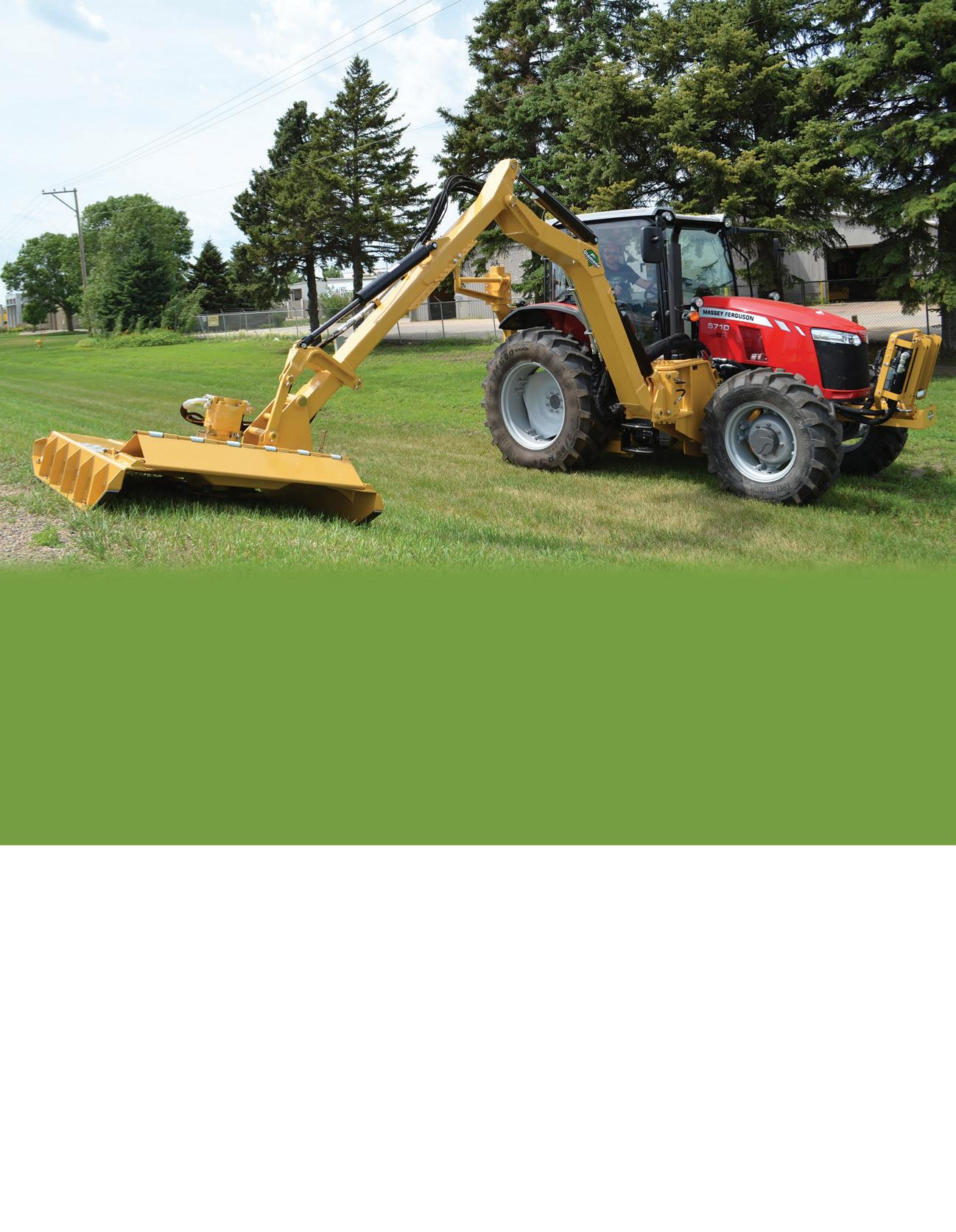


























It’s not just about getting from Point A to Point B. It’s about having the freedom to get out there, live your life, and make memories happen.
At Ergon, we’re proud to deliver the right paving, preservation, and maintenance and solutions designed to keep your road networks safe and strong. Because you have places to go and people to see. Don’t let inferior road conditions get in the way of life’s adventures.

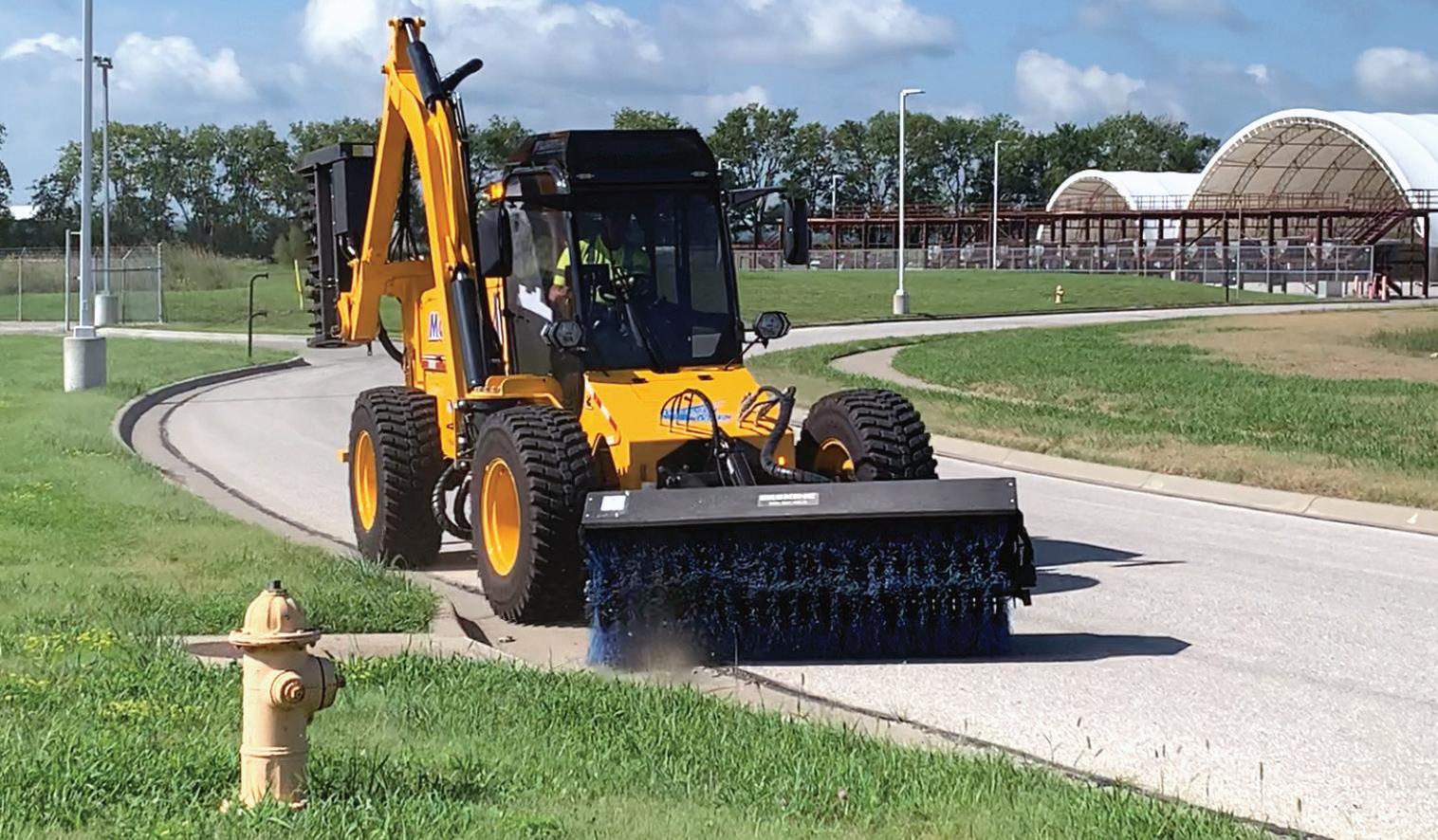

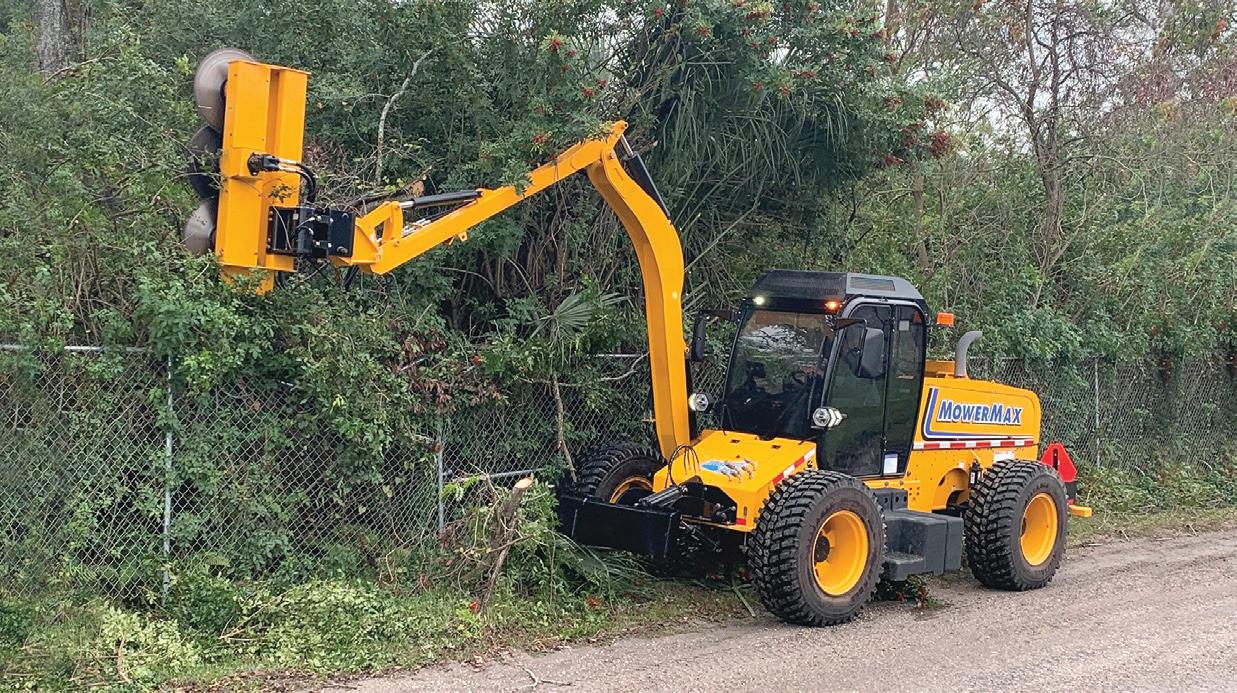


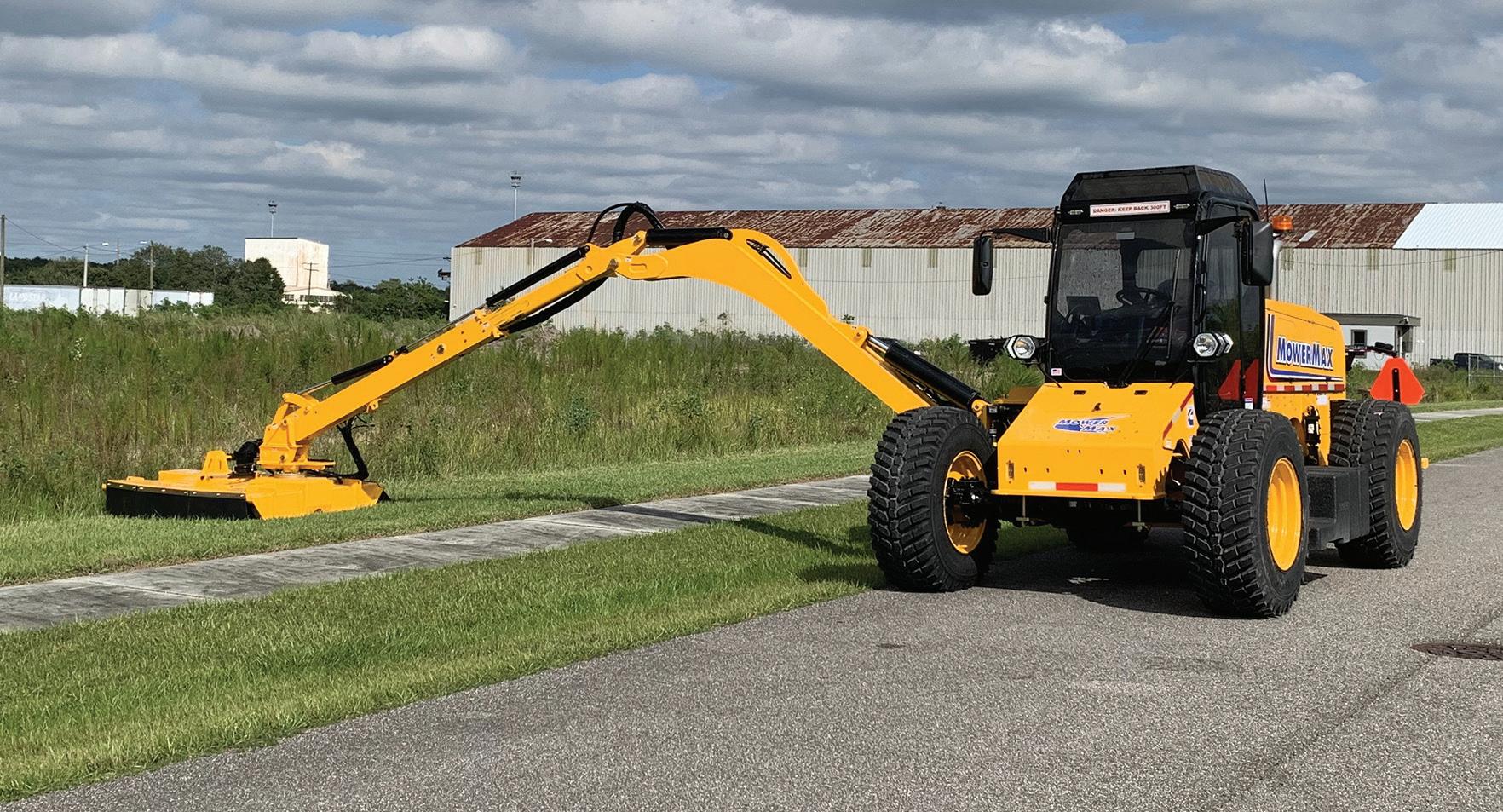


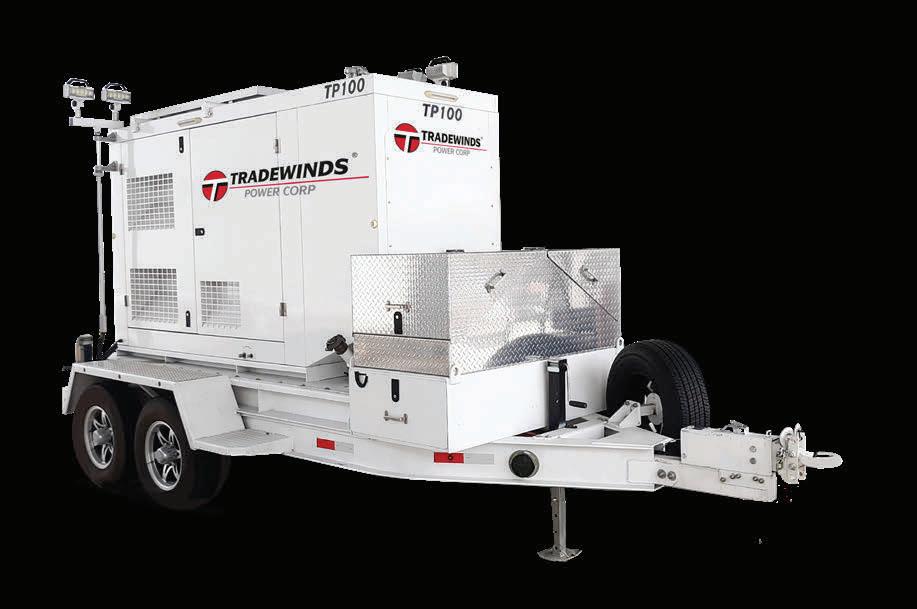
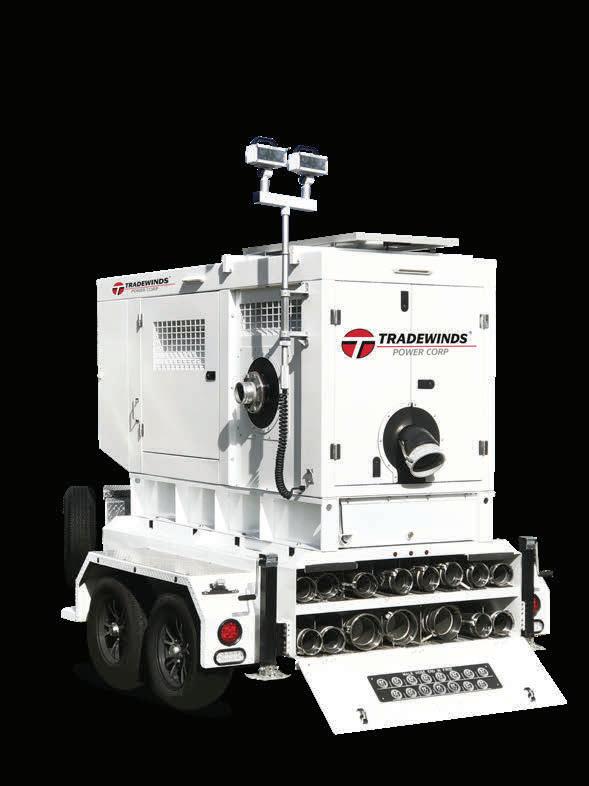

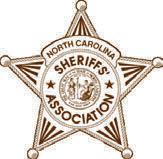



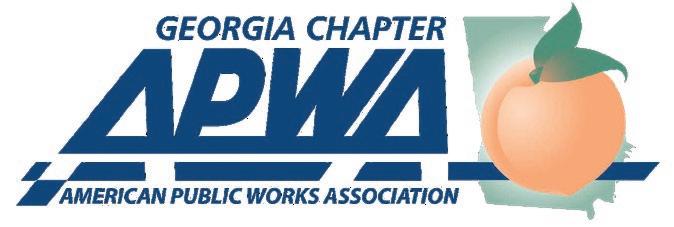








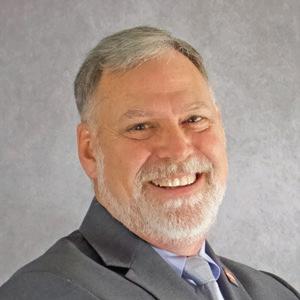
This year started with new and interesting changes that quickly developed into challenges. We saw COVID-19 move from being a pandemic to becoming endemic across the planet. We witnessed supply chain issues brought on by a worldwide shutdown that manifested in vehicle orders being severely delayed and, in many cases, cancelled altogether leaving fleets scrambling to find alternatives. We experienced skyrocketing inflation and fuel prices that have made budgeting a nightmare. However, through this adversity we learned new and innovative ways to adapt, improvise and overcome.
Fleet departments know that being part of the essential worker platform and designated as first responders means that our efforts to keep the equipment rolling are more important than ever. To keep municipal operations viable, we all play a pivotal part in efficiency to keep overall costs manageable. It is now, more than ever, a requirement that we do more with less as shortages and inflation change the way we do business. To keep a well-running fleet available for our various customers to use in their daily operations requires changes in how we keep our inventories, source our fuels, and replace an aging fleet. Perhaps the model of just-in-time inventory ordering is gone, as we stock more parts to see us through longer lead times. Equipment lifespans may lengthen as we deal with replacement availability along with inflation which continues to drive vehicle prices up. The implementation of alternative fuels may accelerate as the nation deals with the highest petroleum prices in recent history. Substantial changes are happening, and fleet services are leading the way.
APWA’s Fleet Management Committee remains committed to researching and sharing new ways of conducting business. They continue to provide updated best practices such as the Managing Public Equipment and The Concise Manual for Calculating Public Fleet Rates manuals. The committee successfully presented the Fleet Management Certificate Program at the 2022 Snow Conference in Pittsburg, PA, and received glowing reviews. The program is now ready for APWA’s chapters to offer using Certified Public Fleet Professionals (CPFPs) as presenters. The in-person training format increases networking opportunities while providing open discussion platforms to continue the growth and development of the program and the industry.
The full CPFP certification program is undergoing a refurbishment and is close to being ready for implementation. The changes reflect the evolving fleet management career path and address the need to maintain the high standard of

qualifications in holding the CPFP credentials. Maintaining the integrity of the CPFP adds to the professionalism of this craft while pushing fleet professionals to stay in touch with the everchanging landscape. The CPFP has set the standard by which we grade our fleet management leaders and now is the time to keep it at the forefront of every fleet professional.
As we continue to unwrap the gift that keeps on giving, COVID challenges us to find new ways to become more efficient with our operation while proving the value of a wellmanaged fleet. By being part of a bigger team within the fleet management community we create an endless stream of ideas and solutions. Being able to provide this vast knowledge to our membership is an invaluable asset. The Fleet Management Committee is, and will continue to be a sounding board as well as a clearing house for all things fleet related. By offering a common platform and sharing all the information – the good, bad, and ugly – we improve our individual fleet services as well as the industry in general. APWA will remain the premiere educational channel delivering quality guidance and support while navigating an ever-changing world.
Fleet services is a cog in the machine that keeps the whole of public works operating smoothly. Fleet provides critical services to those who provide critical services to our citizens and our communities. Each is equally valuable. Working together as one team toward a common goal is how we remain relevant. The Fleet Management Committee remains dedicated to being ready and resilient, proactive, and adaptive to the ever-developing technological and economical world in which we live.
As my father taught me: Let us leave things better than we found them.
By offering a common platform and sharing all the information – the good, bad, and ugly –we improve our individual fleet services as well as the industry in general. APWA will remain the premiere educational channel delivering quality guidance and support while navigating an ever-changing world.
With the APWA membership affirming the selection of Gary Losier as the 2022-2023 President-Elect, one year remains on his term as Director of Region I. Article 4, Section 2(c) of the APWA Bylaws states that “…vacancy in the Board of Directors caused by … election to another office of a Regional Director, such vacancy shall be filled by the Board of Directors following advice and consent of a Regional Nominating Committee…” Chapter Presidents within Region I appointed representatives to serve on a Region I Nominating Committee. The Nominating Committee reviewed the nomination packets and conducted interviews of the candidates, reaching consensus on a recommendation for the APWA Board of Directors. The APWA Board approved the recommendation and appointed Richard Benevento, President, WorldTech Engineering, LLC, Woburn, Mass., to serve the remaining one year of the term on the Board of Directors.

Benevento has been active in APWA since joining the New England Chapter in 1988. He currently serves as the New England Chapter Delegate and is a member of the Steering Committee of the Council of Chapters. He has also served as Chapter President and was a member of the chapter’s Awards Committee. At the national level he has chaired the Awards Committee and was a member of the Congress Program Review Committee, Projects of the Year Awards Committee, and Committee on Bylaws and Rules.
Benevento has worked with APWA national staff on several assignments providing service to its members. In 2014, he participated in a national webinar entitled “Fallen Comrades” where he discussed the New England Chapter’s practice of honoring fallen public works comrades in the line of duty. In 2017, he helped produce the Click, Listen & Learn webinar “Promoting Public Works.”
In 2016, he published an article in the APWA Reporter entitled “Public Works Awareness Front & Center” in which he discussed the importance of acknowledging the public works community for the vital and necessary functions that it provides. In 2019, Benevento was the recipient of APWA’s Distinguished Service Award, the highest award bestowed on a member. This year, he received the New England Chapter’s Distinguished Service Award, and also received the Essex County, Massachusetts Highway Association Distinguished Service Award in 2007.
Benevento has taken a lead role in educating state and municipal officials throughout New England on the Federal Highway Administration’s changes to the Manual on Uniform Traffic Control Devices (MUTCD). The Massachusetts LTAP has reached out to Benevento to present statewide workshops on MUTCD compliance measures. He has been a regular presenter at public works conferences and workshops. In 2003, as Chairman of the New England Chapter Spring Meeting, he arranged a Transportation Summit where the Secretaries of Transportation from all five New England Chapter states met for a roundtable discussion on important transportation topics. He is a member of the Commonwealth of Massachusetts State Transportation Innovation Council that works with FHWA and state DOTs on all aspects of accelerated project delivery.

In 2019, Benevento was the recipient of APWA’s Distinguished Service Award, the highest award bestowed on a member.Rich Benevento

Can you believe that the year is almost over? I enjoyed seeing and meeting many of you all down at the Georgia APWA Annual Meeting on Jekyll Island and the PWX in Charlotte, NC in August. As we head toward the end of the year, our hybrid format is proving to be a success for the Metro Atlanta Branch.
We convened for our first in-person meeting in two years at the City of Douglasville in June, where we honored Teresa Smith with the Top Ten Public Works Leader of The Year
Award, with Past Region IV APWA Director Doug Layton presenting her with the award. Also in attendance to celebrate this momentous occasion was Past National APWA President Bill Spearman and Past Georgia Chapter Presidents Lawrence Jeter and Shirley Stevenson.
We will continue the hybrid format in 2023, holding in-person meetings with a concurrent virtual option offered for those who want to participate but cannot attend in person. We are also looking to partner with local universities who would have the available technology and facilities, and
would like to thank City of Douglasville (June 2022), City of Decatur (July 2022), and Kahua Inc. (September 2022) for hosting our in-person meetings this year so far. I would also like to congratulate the award winners representing the Metro Atlanta Branch down in Jekyll Island back in August. My time is winding down as President, and while I am sad, I am also excited for the future of the Metro Atlanta Branch of APWA. We will continue to do what we do best, and that is to be READY AND RESILIENT!


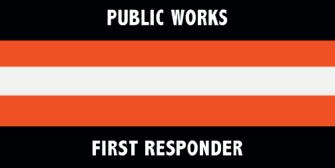
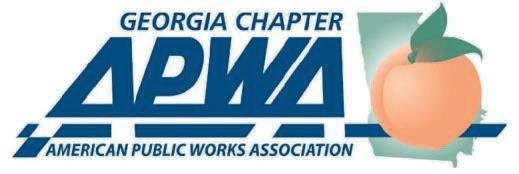


NORTHEAST
NORTHWEST
SOUTHEAST
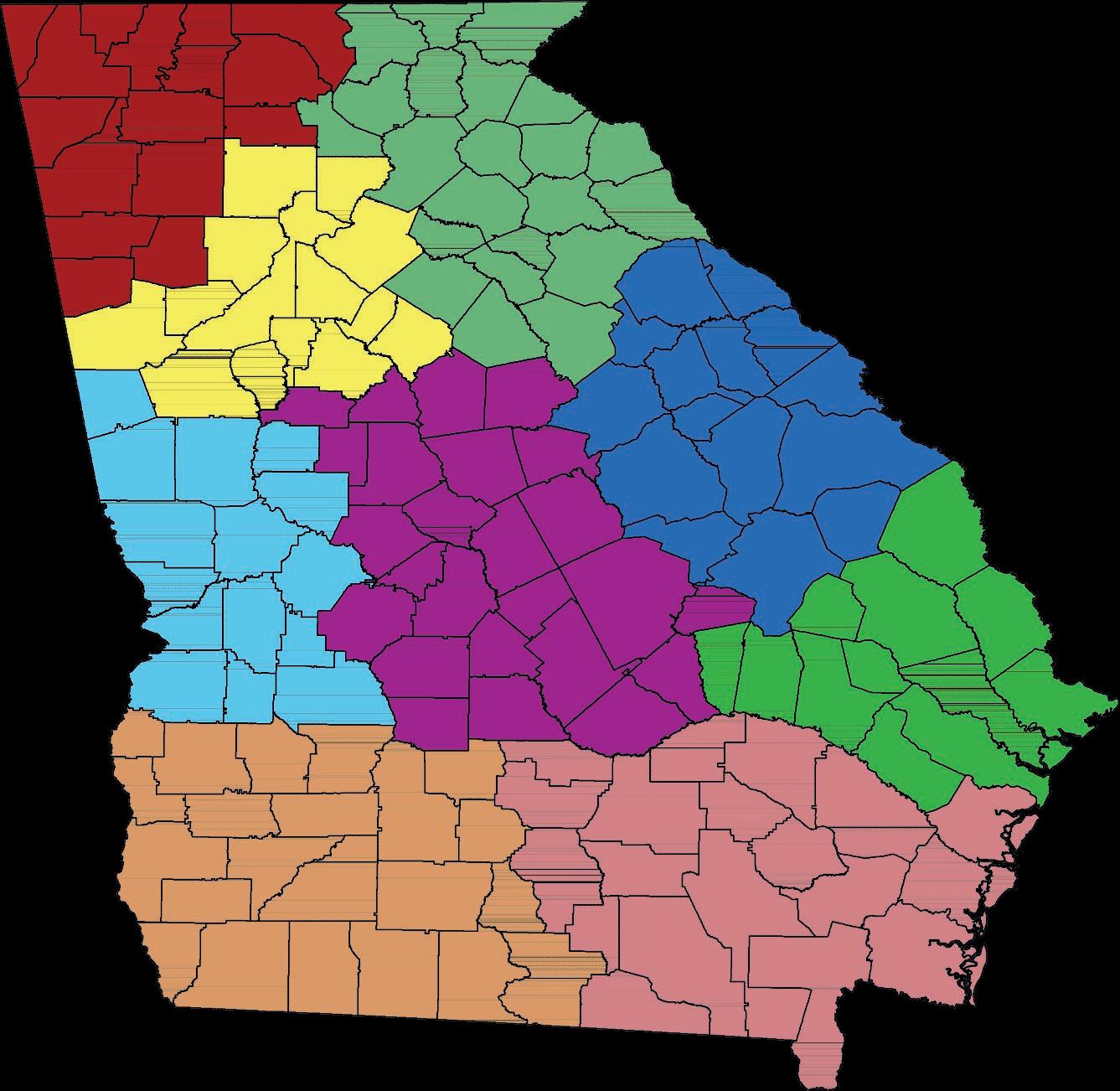
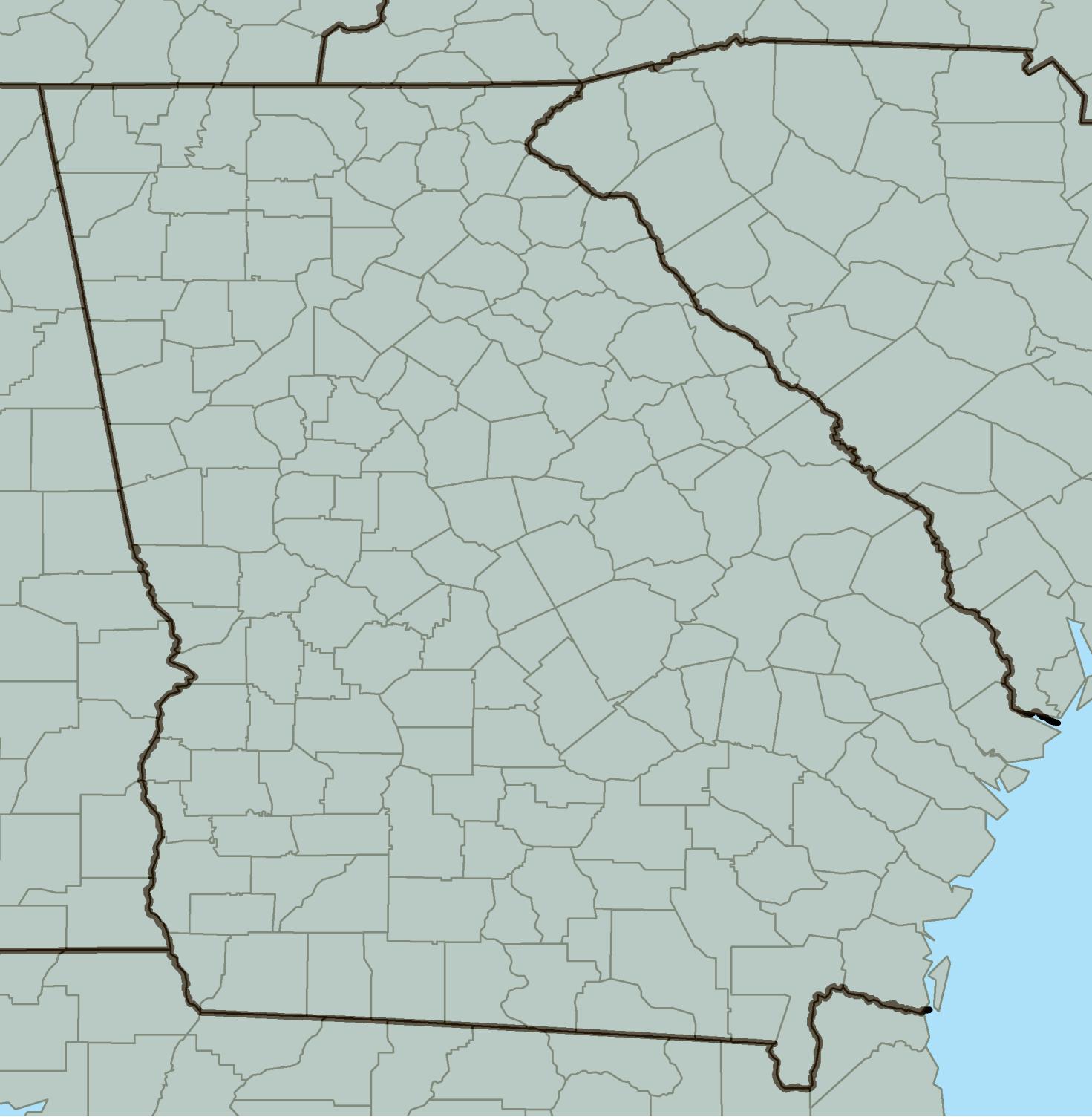

SOUTHWEST
WEST
jmang@columbusga.org
Memberships are extended to both current or past public works employees as well as to private company employees who interact with the American Public Works Association.
Membership comes with the opportunity to share common goals, challenges, and solutions with Public Works professionals throughout North America.
As a member, you’ll participate in local Chapter and Branch programs meetings – often at reduced pricing; gain exposure to more than 30,000 Public Works professionals; save money on the best education and training programs in Public Works, covering all disciplines with ability to receive CEUs and PDHs; gain free subscriptions to many infoNOW electronic networking communities and resources, including the APWA Reporter Magazine; receive free access to the Resource Center and registrations for live Click, Listen & Learn programs; and pay reduced pricing for books, videos, construction, water resources and more.
As a member, you’ll save up to 42% on registration for PWX, the NORTH American Snow Conference and most nationally sponsored workshops and e-learning programs; earn your professional certification credentials; have networking opportunities at the national, local chapter and/or branch level; and receive discounts on advertising opportunities in the APWA Reporter Magazine and exhibitor space at the annual PWX* (*Corporate Crown Level Group Memberships only ).
APWA is your primary resource for public works-related knowledge.
Become an Individual or Group Member of the APWA Individual APWA membership automatically includes a one-year membership to your local APWA or CPWA Chapter.

Individual Membership is available to:
• any official or employee (active, retired, or life) of a government agency, manufacturer, supplier, contractor, student, or consulting firm who is actively engaged in the field of Public Works.
Group Membership is available to:
• Student Groups,
• Public Agency Groups,
• One-Call Center/System Groups,
• Corporate Groups,
• Prestige Corporate, and
• Crown Corporate.
To learn more about APWA’s membership groups and how to become a Member, visit www.apwa.net
Membership comes with the opportunity to share common goals, challenges, and solutions with Public Works professionals throughout North America.

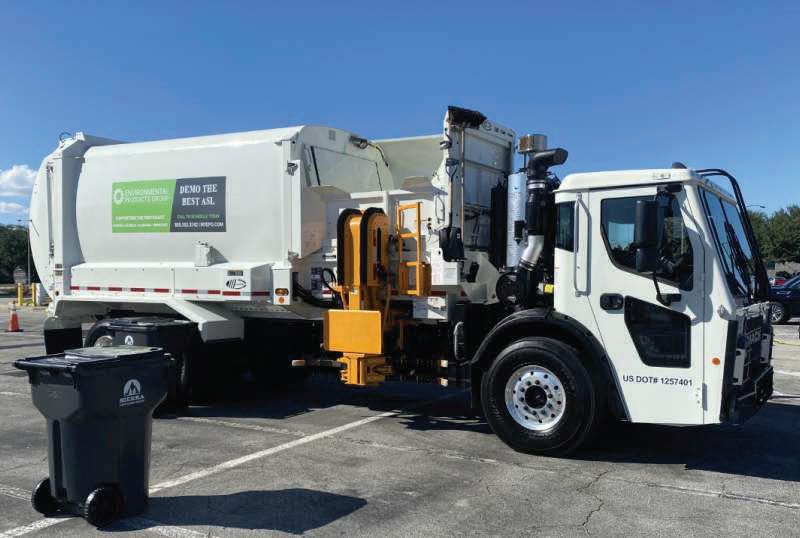


New SMART and AT programs support innovation that advances American competitiveness, fights climate change, improves safety and helps Americans save time and money
In September, the U.S. Department of Transportation announced that it is accepting applications for two programs that will make approximately $160 million available annually for the next five years for projects that use technology to improve our transportation infrastructure and make communities safer.

The first program is the new Strengthening Mobility and Revolutionizing Transportation (SMART) Grants Program. The SMART Grants Program is made possible by the Bipartisan Infrastructure Law, signed by President Biden on November 15, 2021. The program will offer up to $100 million in grants annually over the next five years and will fund projects that use data and technology to solve real-world challenges facing communities today.
“As we undertake the most ambitious infrastructure investment in generations, thanks to the President’s Bipartisan Infrastructure Law, we can and must plan for the transportation needs of the future,” said U.S. Transportation Secretary Pete Buttigieg. “From connected vehicles that make driving safer, to smart traffic signals that reduce congestion, to sensors to detect the quality of pavement to help prioritize repair, our SMART grants will fund technology that makes people’s lives better in communities across America.”
The SMART program will fund purpose-driven innovation and focus on building data and technology capacity and expertise. The Program seeks proposals from public sector entities that will carry out demonstration projects in the following domains to address key transportation priorities:
• Vehicle technology, like automation and connectivity
• Systems innovation, like delivery and logistics, traffic signals, smart grid, and data integration
• And new ways to monitor and manage infrastructure, like sensors and UAS

“Achieving our transportation priorities related to safety, economic strength, equity, and climate requires bold investment in new technologies and approaches,” said Dr. Robert C. Hampshire, Deputy Assistant Secretary for Research and Technology and Chief Science Officer at US DOT.
“SMART supports a broad portfolio of projects across the country that will serve as beacons as we move toward a transportation system that is data-driven, values-based, and technology-enabled.”
The second is the Federal Highway Administration’s $60 million Advanced Transportation Technology and Innovation (ATTAIN) program to promote advanced technologies to improve safety and reduce travel times for drivers and transit riders and that can serve as national examples. As a result of the Bipartisan Infrastructure Law, ATTAIN-eligible projects will be evaluated on how they consider climate change and environmental justice impacts – including how they reduce transportation-related air pollution and address the disproportionate impacts on disadvantaged communities. In addition, projects are evaluated on their economic impact and potential to create jobs.
“As we level the playing field and improve the travel experience for everyone, we need to promote the use of state-of-the-art technologies, and the ATTAIN program does just that,” said Acting Federal Highway Administrator Stephanie Pollack. “The Biden-Harris Administration has taken a program with a track record of delivering innovation through the use of advanced technologies and made it truly forward-looking by refocusing its goals to include promoting equity and tackling climate change, in addition to creating jobs and delivering positive economic impact.”
The SMART Notice of Funding (NOFO) is open now and can be found at www.grants.gov Applications must be submitted by 5:00 PM EDT on Friday, November 18, 2022. Eligible entities are state, local, and tribal governments and agencies. For more information visit www.transportation.gov/grants/SMART
The ATTAIN NOFO can also be found at www.grants.gov. State departments of transportation, local governments, transit agencies, metropolitan planning organizations and other eligible entities are invited to apply. Applications must be submitted by Friday, November 18, 2022. For more information, visit the FHWA website.
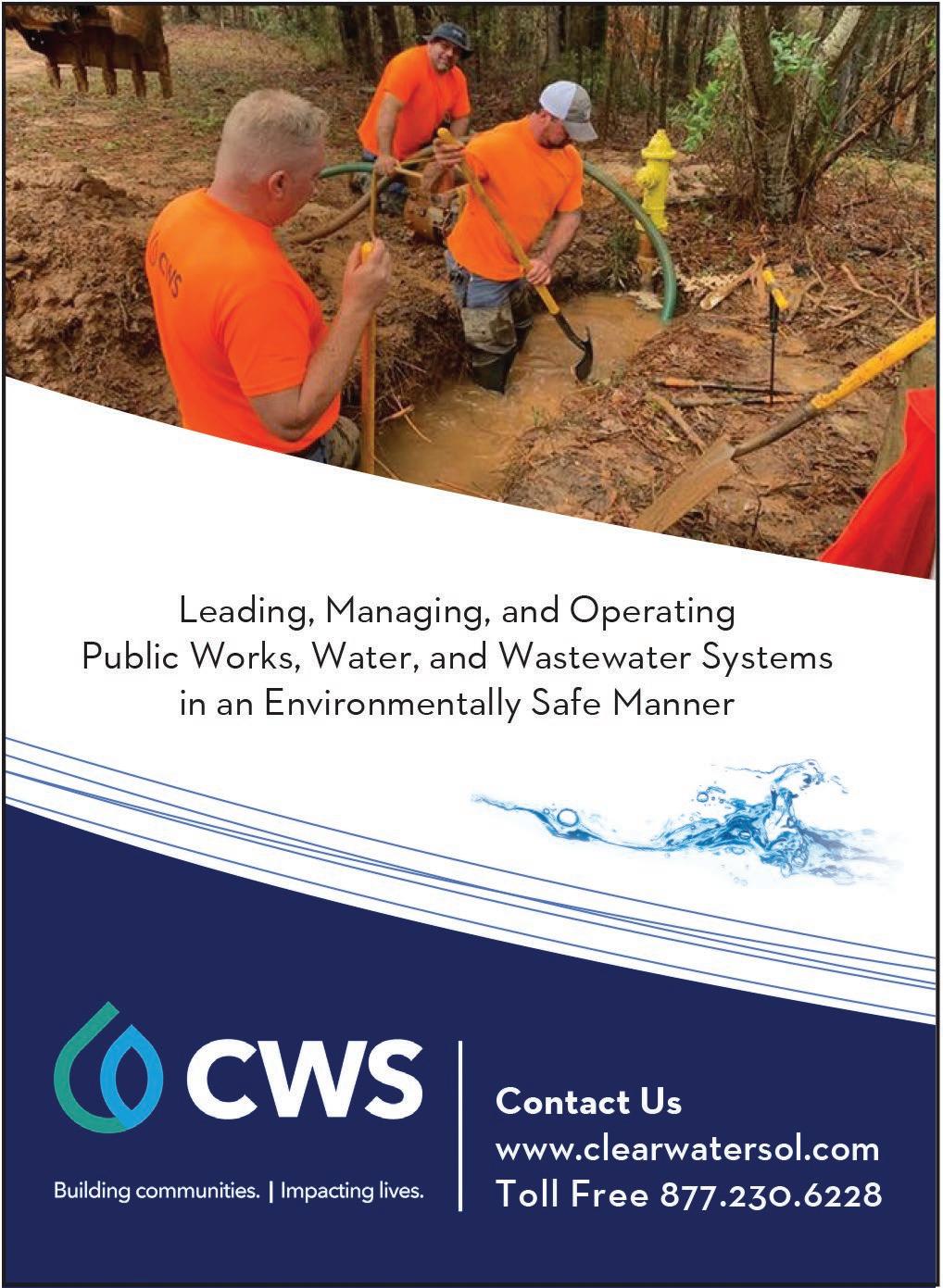

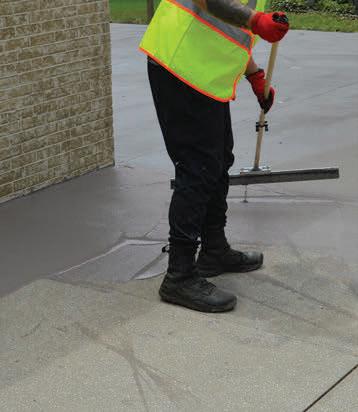






























What a Great PWX! This was my first PWX, and to have it in our state with our chapter as the host to thousands of attendees was exciting. It demonstrates that APWA is not just a fantastic organization, but also an extended family and group of life-long friends who are ready and willing to help whenever needed.

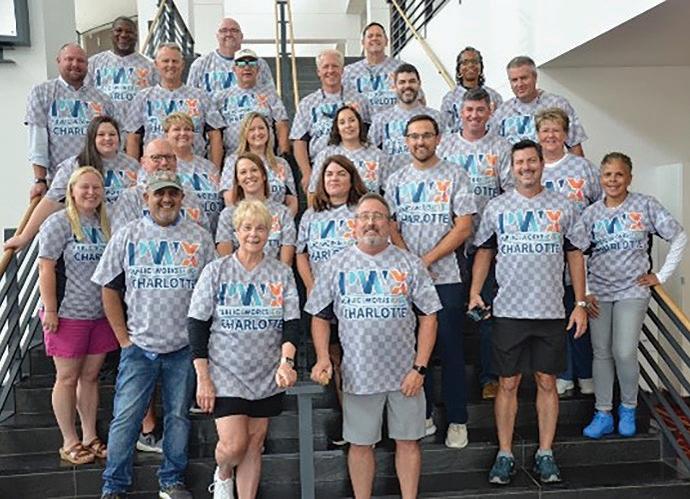
The North Carolina Chapter was thrilled to host their first PWX in Charlotte. Thanks to the hard work of our host committee over the last several years, our chapter was able to host many events during the PWX. We had the Board Reception at the Discovery Place; the Golf Outing at the Rocky River Golf Club; the Brewery Tours –featuring the Birdsong, NoDa, and Heist breweries; the YP/International Reception at Ink and Ivy; the Get Acquainted Party at the NASCAR Hall of Fame (with a fantastic band); The Futures Program; the Rodeo; the 5K Run; and the technical tours. The APWA NC hospitality area provided a caricature artist, photo booth, chair massages for those who wished
to participate – not to mention the Krispy Kreme bread pudding, Bo Berry biscuits, popcorn, and beer. The backpacks, totes, challenge coins and water bottles were a big hit. None of these things could have occurred without the support of our great vendors and partners who have supported our chapter.
The number of exhibitors and the vast number of products they offer helped all attendees do their jobs better and more productively. I hope everyone took advantage of their expertise.
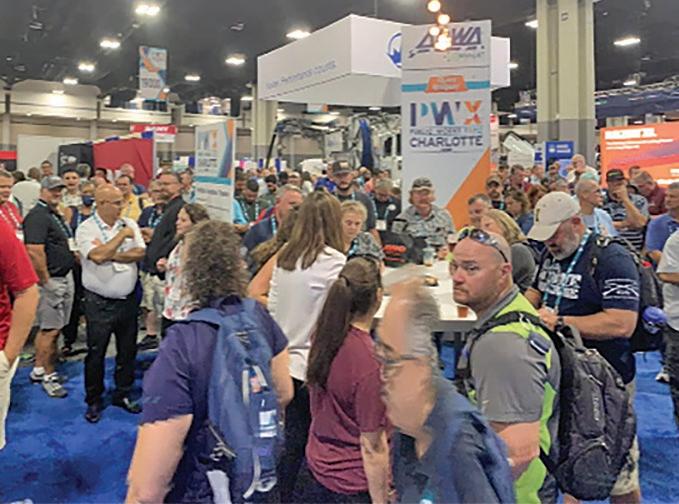
As Fall approaches, please remember to get out and enjoy your surroundings and start planning for PWX 2023 to be held in San Diego!
I’m also looking forward to attending our PWX conventions in Chicago and Atlanta!

Respectfully,
 Rebecca “Becky” Bost APWA-NC President
Rebecca “Becky” Bost APWA-NC President
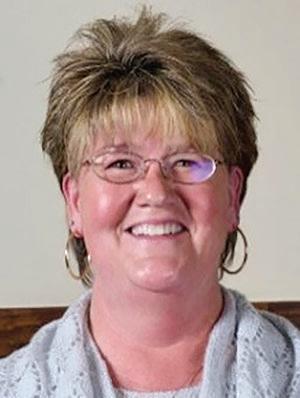 APWA’S PWX 2022 CONFERENCE
APWA’S PWX 2022 CONFERENCE







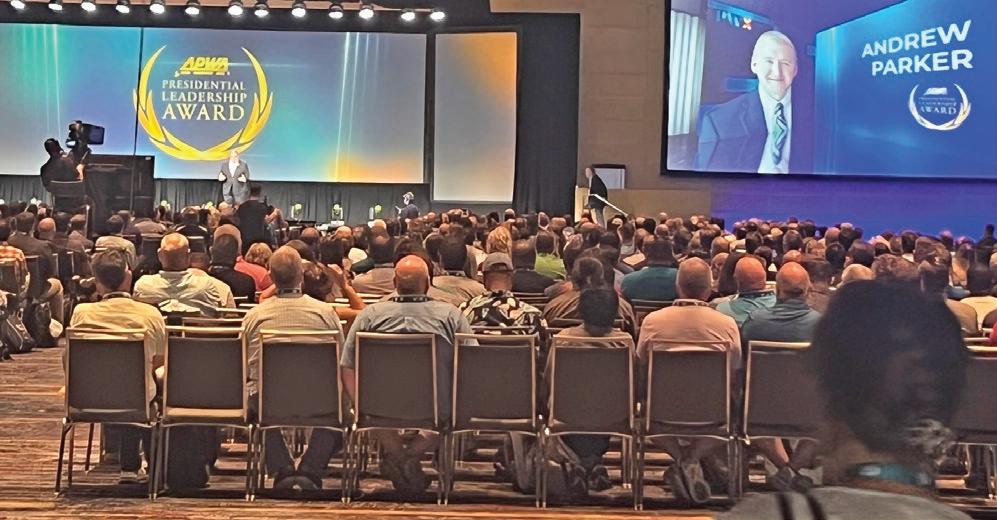












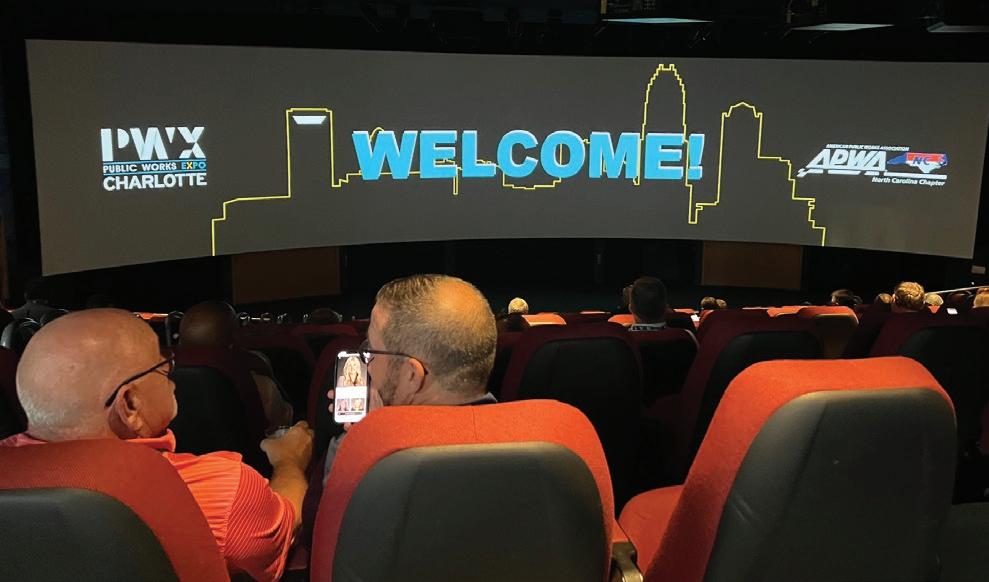
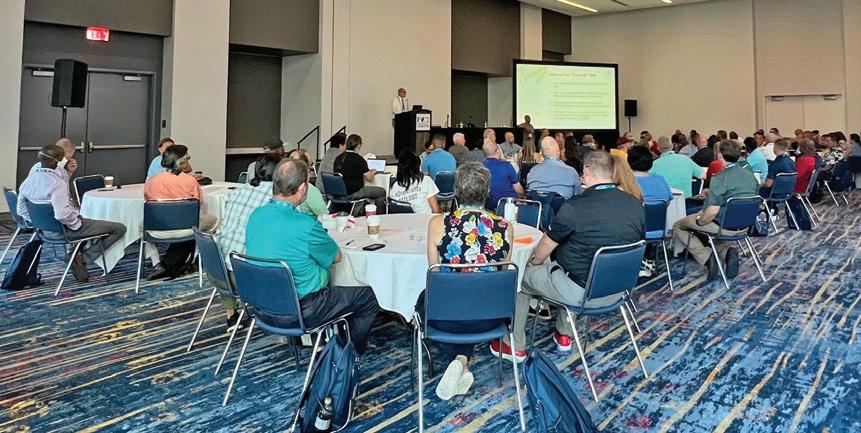

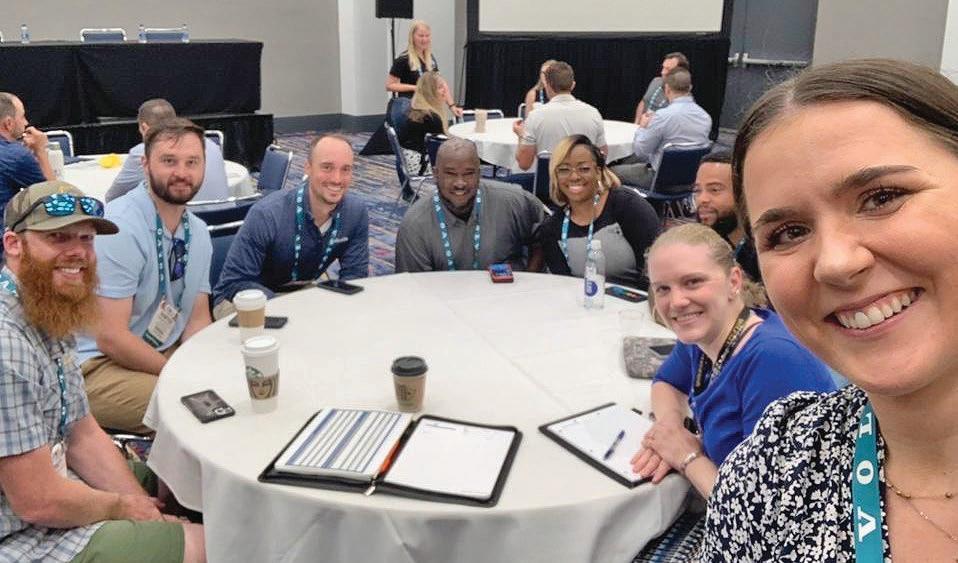
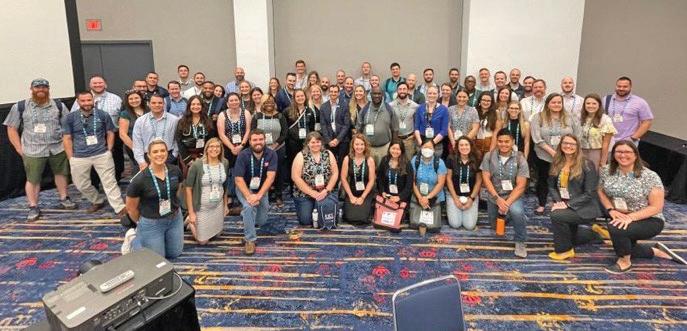





The richness and diversity of Public Works was on full display throughout PWX largely due to the efforts of the National Committee for Diversity, Equity, and Inclusion (DEI). The mission of the Committee is “to foster the inclusion, participation and equitable treatment of APWA members without regard to gender or gender identity, race, national origin, ethnicity, religion, age, sexual orientation, physical or cognitive ability, political affiliation, or family, marital or economic status.” A key component of the mission is to provide resources to public works professionals to further increase the awareness of and advancing diversity, equity, and inclusion in the workplace. If this sounds like a tall order, it is. As individuals, public agencies, and organizations we are all at different places in our DEI journey. With that understanding, the Committee designed events and sessions at PWX that catered to a wide variety of experiences and learning opportunities.
For the first time in three years the Committee was able to meet face-to-face to discuss its plans to advance APWA’s mission by infusing DEI principles and practices throughout the organization. During this year’s pre-conference committee meeting, the DEI Committee collaborated with the Young Professionals, Workforce Development and Leadership and Management Committees to strengthen relationships and identify areas of combined interest. This crosscollaboration created an even stronger network devoted to forging connections and reinforcing alignment among the work of all these important groups.
Kicking off PWX was the First-Timers Breakfast, designed to set the tone for building a welcoming environment for everyone attending PWX. As one of the speakers, DEI Chair Casey Ambrose
delivered opening remarks which emphasized the wealth of opportunities available for all PWX attendees to enhance and enrich their conference experience. Making new connections and friendships is one of the key outcomes of this signature event.


A highlight of PWX is the annual Diversity Brunch hosted by the Committee on Tuesday morning. This year’s speaker, Tenisha Patterson Brown, Esq., offered an inspiring and interactive talk titled “Authenticity Redefined: The True Power of You.” Through personal stories of her experiences as a sports attorney, business consultant, entrepreneur, author and philanthropist, Tenisha delivered a powerful message of speaking and standing in our truth. Speaking to the many dimensions of diversity she challenged the audience to consider how authenticity, both personal and
organizational, is the way to true inclusion and high performance. More than 100 attendees filled the room with an environment of openness, positivity, vulnerability, and a shared sense of our common humanity.
Standing room only audiences attended the two conference sessions presented by the Committee during PWX. In the “Diversity, Equity and Inclusion in Public Works” session, moderated by committee member Edric Kwan and featuring noted DEI expert Andre Robinson, attendees engaged in active discussions around topics such as micro-aggressions, unconscious bias, intersectionality, and privilege. It was an opportunity for open dialogue around these challenging topics, offering a multitude of ideas and solutions for attendees to take back to the workplace. Deepening understanding of contemporary terms
Craddock Stropes, APWA Committee for Diversity, Equity, and Inclusion | Senior Management Analyst, City of Carlsbad (CA)and concepts around DEI is critical for public works professionals seeing to attract and retain top talent who cite as sense of belonging as one of the leading reasons to stay with an organization. This session delivered just that in a way that brought professionals together in a non-judgmental setting that encouraged honest conversations.
Real-life stories of lived experiences are a highly effective way to promote understanding of diverse perspectives and future change. The “Women in Public Works” panel discussion, moderated by committee members Joy Guinn, brought robust real talk about gender equality in public works. The panelists included leaders in front line operations and engineering: Cate Thompson, PE, Kamron Nash, Raquel Floyd and Alysen Abel, PE. Candid discussions about the unique challenges women face, overcoming bias, and uplifting other women in the workplace were both affirming and eye-opening. The words of wisdom shared had the rapt audience eager to hear more and willing to stay late to prolong the opportunity to learn from these remarkable women.
In addition to these sessions, PWX speakers shared additional DEI case studies and best practices in emergency management and asset management.

The current National DEI Committee members include:
• Chair: Casey Ambrose, PE, Senior Project Manager, Town of Gilbert, AZ
• Joy Guinn, Partner/Principal, Guinn Consulting Engineers LLC
• Shauncey Battle-Williams, Project Manager, Atlanta Department of Transportation


• Craddock Stropes, Senior Management Analyst, City of Carlsbad, CA

• Michael Frierson, Public Relations Manager, City of Atlanta Department of Transportation
• Edric Kwan, Vice President, SCI Consulting Group
• Roby G. Whitehouse, Assistant Public Works Director, Town of Yarmouth, MA
• Diana W. Clonch, Owner, D.W. Clonch
• APWA Board Liaison: Kristina B. Nelson, PE, APWA Region 9 Director, Senior Program Manager, Kitsap County, WA

• APWA Staff Liaison: Phyllis Muder, CAE, Sr. Manager of Certification & Career Programs, APWA KC, MO
APWA is proud of its long-standing and ongoing commitment to fostering DEI. Though the journey remains long and challenging, furthering DEI as a foundational guiding principle in public works is the key to building a shared, sustainable future where everyone feels like they belong.
“REAL-LIFE STORIES OF LIVED EXPERIENCES ARE A HIGHLY EFFECTIVE WAY TO PROMOTE UNDERSTANDING OF DIVERSE PERSPECTIVES AND FUTURE CHANGE.”
Ioften get the question, “What exactly do you do as a Solid Waste Consultant?” I answer, “I do business planning and management work, but I also sort garbage.” Sorting through the garbage that has been stuffed in a bag, sat in a cart for up to a week, compacted, and taken a ride in a vehicle in various communities throughout the USA. So why do it?
Every solid waste professional understands that the only way to properly plan and implement a quality integrative waste management program requires knowing what is in your waste stream. A Waste Composition Study (WCS) is the most accurate way to identify what waste materials are in your waste stream that could potentially be recycled or composted to make effective program planning decisions. It is conducted for a variety of reasons, including but not limited to, measuring the effectiveness of diversion programs, changes in the waste stream that might impact recovery projections, increasing recycling by targeting additional materials, strengthening existing programs, or evaluating the need for additional solid waste management facilities or technology improvements to existing facilities.
But all garbage is local. What is found in one community may not hold true for another. Local recycling programs, consumer habits, demographics, tourism, and seasonal variations (population and climate) all impact what you find in the waste stream. Changes in product design, packaging, and consumer
purchasing preferences are also reflected in the study results. Knowing this information is important for making decisions for running an economically feasible and sustainable integrative solid waste management system.
However, there are multiple studies, in addition to a WCS, that provide additional information and data for waste management planning. Listed here is an overview of them:
1. Recycling Composition Study (RCS): An RCS is an analysis of samples of in-bound recyclables taken from areas around the host community’s customer base. These samples are then sorted into categories based on the community’s accepted recyclables program to determine


THE VALUE OF GOOD DATA AND WHAT TO USE IT FOR
“ Every solid waste professional understands that the only way to properly plan and implement a quality integrative waste management program requires knowing what is in your waste stream.”
each recyclable commodity’s percentage and the recycling stream’s contamination. This study supports a processing procurement or updates to a processing agreement but also provides valuable information on the quality of in-bound recyclables from particular areas of the community, as well as what products are being recycled and whether they are being recycled correctly.
2. Capture Study (CS): A CS is a consolidation of RCS and WCS principles but with the focus being on recyclables in the waste and recycling stream. A CS calculates the percentages that each recyclable material (and overall recyclables) is captured in the recycling stream. This study provides data on what types of materials are not being recycled. This helps the community further assess recycling education & outreach (E&O) material impacts for behavioral changes, the effectiveness of collection services, or if issues are geographically or socioeconomically related.
3. Generation and Capture Study (GCS): A further iteration of a CS is a GCS that also takes the data received and estimates potential generation rates using data on the customers included in the study. This study uses customer count data provided by the community and develops generation rate estimates for the type of customers included in the study. Generation rates can be calculated for the overall waste and recycling streams and individual material types.
4. Source Study (SS): A SS can be any of the four types above but includes a specific collection exercise where particular samples are retrieved from units, customers, or locations as designated by the client. KCI has performed SS with singlefamily residents and multi-family properties by gathering trash and recycling that has been set out for collection and used the data to develop capture and composition rates across a community or group of properties.
These studies provide solid waste professionals with a current snapshot of collected materials generated by a particular population that have statistically significant results. Population sectors targeted in these studies can include residential households, multi-family dwelling units, commercial businesses,


construction and demolition (C&D) sites, school districts, or large institutions (e.g., hospitals, government buildings). When looking at your future budget cycle, master plan, or ten-year improvement program, this data is a quantifiable and invaluable planning and management tool, no matter how small or large the study.
Chas Jordan, Kessler Consulting, Inc. (KCI) in Tampa, FL. KCI is celebrating its 34th year in business. As a Senior Consultant, Chas manages projects with a focus on rate studies, management planning, operation assessments, implementation, and composition studies. He has worked in the industry for over a decade. For further information, contact Chas at cjordan@kesconsult.com or visit www.kesconsult.com
Editor’s Note: Originally printed in the Summer 2022 issue of Florida Public Works - reprinted with permission from The Florida Chapter of the APWA, the author, and the publisher.

“
These studies provide solid waste professionals with a current snapshot of collected materials generated by a particular population that have statistically significant results.”
As we continue to deliver valuable information through the pages of this magazine, in a printed format that is appealing, reader-friendly and not lost in the proliferation of electronic messages that are bombarding our senses, we are also well aware of the need to be respectful of our environment. That is why we are committed to publishing the magazine in the most environmentally-friendly process possible. Here is what we mean:
• We use lighter publication stock that consists of recycled paper. This paper has been certified to meet the environmental and social standards of the Forest Stewardship Council® (FSC ®) and comes from responsibly managed forests, and verified recycled sources making this a RENEWABLE and SUSTAINABLE resource.
• Our computer-to-plate technology reduces the amount of chemistry required to create plates for the printing process. The resulting chemistry is neutralized to the extent that it can be safely discharged to the drain.
• We use vegetable oil-based inks to print the magazine. This means that we are not using resource-depleting petroleum-based ink products and that the subsequent recycling of the paper in this magazine is much more environment friendly.
• During the printing process, we use a solvent recycling system that separates the water from the recovered solvents and leaves only about 5% residue. This results in reduced solvent usage, handling and hazardous hauling.
• We ensure that an efficient recycling program is used for all printing plates and all waste paper.
• Within the pages of each issue, we actively encourage our readers to REUSE and RECYCLE.
• In order to reduce our carbon footprint on the planet, we utilize a carbon offset program in conjunction with any travel we undertake related to our publishing responsibilities for the magazine.
Cybersecurity is no joke. As political tensions rise and cyberattacks ricochet through the 24-hour news cycle, navigating cyber-safety may seem like a daunting task; however, by taking one step at a time to improve your cyber-habits, you too can improve your chances at remaining safe and secure in our tech-based world.


The Art of the Password
Unless you’ve been living off-the-grid for 20 years, odds are you have a password or two. Passwords are part of life, whether you’re an online shopper, a hardworking professional, or an excitedto-get-back-to-it concert buff. Passwords are important. They keep our assets – our identities, credit cards, messages, and bank accounts – safe in the online world. But what if your passwords aren’t secure enough? What if all that data could be stolen and sold without your knowledge?
You may be asking, “Why would a hacker want my data?” Usually, data hacks are motivated by financial gain. According to LMG Security, a Montanabased cybersecurity and digital forensics service provider, commonly targeted data includes PIN numbers, Social Security Numbers, Tax IDs, Employee W2 forms, payment card information, medical records, and access to other accounts. Each of these items can sell for up to USD$250 on the dark web, the unlisted part of the internet where criminal activity may occur.
Your information and data are important and valuable. That’s why proactively pursuing the most secure password option you can is a vital priority.
In 2021, NordPass, a subdivision of global cybersecurity leader Nord Security, released a list of the top 200 passwords used in 50 countries. This research was compiled in partnership with independent researchers specializing in research of cybersecurity incidents.
The US was categorized as one of the most at risk for data leaks. Globally, the worst passwords included 123456, 123456789, 12345, qwerty, password, and 12345678.
In the 2020 list, NordPass showed that most of the 200 offending passwords could be cracked in less than a minute. With technological advances, the hacking of these passwords will only continue to become easier for those looking to sell your information, changing the question of “if” your password will be hacked to a more certain “when.”

Globally US Canada
1 123456 123456 123456
2 123456789 password password
3 12345 12345 123456789
4 qwerty 123456789 12345
5 password password1 12345678
6 12345678 aabc123 qwerty
7 111111 12345678 abc123
8 123123 qwerty tiffany
9 1234567890 111111 password1
10 1234567 1234567 testing
11 qwerty123 1234 hockey
12 000000 iloveyou 1234567
13 1q2w3e sunshine iloveyou
14 aa12345678 monkey 1234
15 abc123 1234567890 canada
16 password1 123123 1234567890
17 1234 princess 111111
18 qwertyuiop baseball sunshine 19 123321 dragon 123123
20 password123 football dragon
The top 20 entries globally, in the US, and Canada, from NordPass’ Top 200 Most Common Passwords study. The complete list can be seen at https://bit.ly/3uArK2z.
It’s easy to feel like you’re out of your depth when it comes to cybersecurity and protecting your information; however, there are steps you can take when it comes to creating, maintaining, and using passwords on the web.
When looking through NordPass’ Top 200 Most Common Passwords, many simple words and phrases jump out at you, like sunshine, soccer, baseball, princess, monkey, summer, and – of course, password.
According to McAfee, global leader in online protection for consumers, you should never use common words or names within passwords. These can be easily cracked and when you are trying to protect your data, especially data of high importance, these passwords will not do what they need to do. McAfee also applies this rule to compounds of multiple words, urging readers to avoid combinations like “IloveLabraDorReTrievers” when creating a secure password.
Shift Away from KnowledgeBased Authentication Perhaps when the internet first began, it may have been okay to use the name
of your first pet, the school your father graduated from, or your mother’s middle name as a password. These are all examples of knowledge-based authentication (KBA) still used routinely across organizations.
According to LMG Security, while these systems are easy to set up, they can easily be subverted by criminals with access to the right stolen secrets – and it’s not hard to find that kind of information, as online inforomation sharing has become the norm.

In a 2013 study by the US Defense Advanced Research Projects Agency (DARPA), researchers found that about half of all passwords used at a Fortune 100 company followed five common patterns. McAfee summarized three, which are listed below:
• One uppercase, five lowercase, and three digits (Example: Komand123)
• One uppercase, six lowercase, and two digits (Example: Komando12)
• One uppercase, three lowercase, and five digits (Example: Koma12345)
Though these passwords perform better than using a simple word, like sunshine, stepping away from the commonly used patterns will make for a safer dataprotection experience.

When you are making a password, the longer the better. Though remembering a longer passcode can be more difficult, U.S. media and tech website CNET states that eight characters is the minimum requirement for a secure password. Additionally, strong passwords should use everything on your computer –uppercase and lowercase letters, symbols, and numbers.
One of the best ways, currently, to make a password is to create a passphrase. Harvard Information Security recommends two methods when creating passphrases: making an acronym or choosing a unique phrase.
Art of the
US media and tech website CNET states that eight characters are the minimum requirement for a secure password. Additionally, strong passwords should use everything on your computer – uppercase and lowercase letters, symbols, and numbers.
When using an acronym, choose a phrase you can remember and use only the first letters of each word, working in some numbers, capitalization, and punctuation.
For example, the sentence “Mint chocolate chip ice cream: If it isn’t green, why even bother?” becomes “Mccic:Iiig,web?”
The unique phrase method is done by picking four or five letters and then make a phrase using words that start with each of those letters, adding numbers or punctuations if it makes sense. For example, the four characters “MISL” becomes “MaybeIncludeSmallLobsters?”
McAfee recommends creating your password from a song lyric, since people are usually better at remembering song lyrics. If you use the Beatles’ popular song “Yesterday” and convert the first few lines in the song to a password with letters and punctuation, it will create a passphrase. This means that “Yesterday, all my troubles seemed so far away / Now it looks as though they’re here to stay / Oh, I believe in yesterday,” becomes “Y,amtssfa/Nilatt’h2s/O,Ibiy.”
Another way McAfee recommends creating a passphrase is to use a personal statement like “Don’t forget, your wedding anniversary is on October 3rd!” which becomes “Df,ywaioO3rd!”
There are many other ways to make a password that is difficult to crack, but most of them involve thinking outside the box. McAfee recommends treating your keyboard like a constellation and making a password by drawing a pattern on your keyboard. Though this is reminiscent of
“qwerty” and “asdfg,” both of which are not secure, the pattern password will be more difficult to crack as keyboards vary, and patterns are almost infinite.
Making up passwords for every single login you have can be a pain, but not doing so can present a risk to every
“
“
By taking steps to have better password hygiene, perhaps you could prevent the leak of your data and even prevent a cybersecurity breach within your workplace. It’s worth the effort.
account that shares a password –especially when you are targeted by a credential stuffing attack.

Credential stuffing attacks are when hackers “stuff” your compromised password and account information into a variety of cloud services – meaning a compromised social media account can lead to breaches in ecommerce, banking, email hosting, and other data-sensitive services you may have.

According to LMG Security, this kind of data breach can also affect your company or organization’s safety. Data breaches can lead to more advanced attacks on companies and organizations, such as ransomware attacks (a commonly used malware that threatens to publish the victim’s personal data or perpetually block access to it unless a ransom is paid).

By using different passwords on different platforms, you can decrease this risk to yourself and your company or organization.




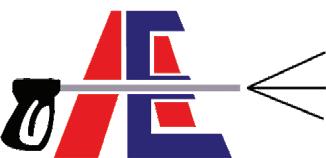
Multifactor verification is becoming more popular across a variety of apps and services, and should be used, when possible, in addition to a strong password. Also known as two-factor authentication, this is when a login requires a second piece of information that only you have before the app or service logs you in, such as a one-time code.
CNET states that even if a hacker does uncover your password(s), without your trusted device (like your phone) and the verification code that confirms it’s really you, they won’t be able to access your
account. However, though it’s common to receive these codes in a text message to your mobile phone or in a call, CNET cautions that it’s simple enough for a hacker to steal your phone number through SIM swap fraud and then intercept your verification code so using an authenticator app may be a safer option.
A big issue when it comes to password is remembering them, and if you’re anything like me, finding a way to avoid resetting your password every time you need to use a certain app. This is why storing your passwords in one place could be helpful, though it is important to be mindful of where and who could potentially access the list.
It’s important to note that your passwords should never be uploaded it to the cloud unless they are in an encrypted file. Data collected by McAfee shows that the average company has 143 files on Microsoft’s OneDrive app that contain the word “password” in the file name. This is why the general consensus is that passwords should either be stored in a physical notebook or in a password manager. These two methods both ensure that even if someone is able to access your computer, the data is not as easily accessible.
CNET recommends that if you go with a physical copy, keep it in a locked drawer and limit the amount of people who know where that information is – especially if there are financial accounts involved.
If you choose to go with a password manager, the one caveat is that you must remember a master password to access your other passwords. CNET also
cautions uses of password managers associated with browsers, as they are more susceptible to data breaches than apps created specifically for password storage. Trusted password managers like 1Password or Bitwarden are generally less hackable, can create and store strong passwords for you, and be used across desktop and mobile devices.

Life is not simple or easy, but by doing little things like making passwords more secure we can make our lives a little less chaotic. By taking steps to have better password hygiene, perhaps you could prevent the leak of your data, and even prevent a cybersecurity breach within your workplace. It’s worth the effort.
Check Point Software Technologies Ltd. (2022, January 10). Check Point Research: Cyber Attacks Increased 50% Year Over Year [web log]. Retrieved from www.blog.checkpoint. com/2022/01/10/check-pointresearch-cyber-attacks-increased50-year-over-year
Colby, C., & Profis, S. (2022, February 7). What makes a good password? 9 rules to protect you from cyberattacks. CNET - TECH. Retrieved from www.cnet.com/tech/mobile/ 9-rules-for-strong-passwordshow-to-create-and-rememberyour-login-credentials.
Harvard Information Security. (n.d.). Use Strong Passwords [web log]. Retrieved from www.security.harvard.edu/usestrong-passwords
LMG Security. (2022, January 4). What Hackers Do with Stolen Data and How to Reduce Your Risk After Data is Taken [web log]. Retrieved from www.lmgsecurity.com/what-hackersdo-with-stolen-data-how-to-reducerisk-after-data-is-taken
McAfee Cloud BU. (2015, August 7). How to Create a Strong Password You Actually Remember McAfee Cloud BU [web log]. Retrieved from

www.mcafee.com/blogs/enterprise/ cloud-security/how-to-create-a-strongpassword-you-actually-remember NordPass. (2022). Top 200 most common password list 2021. Retrieved from www.nordpass.com/most-commonpasswords-list
Katie Woychyshyn is a writer and editor from Winnipeg, MB with a degree in Creative Communications. Since 2018, she has written for trade publications on industries that include forestry, mining, water and wastewater, trucking, and restaurant management.



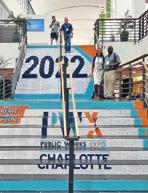











With print and electronic communication operating hand-in-hand you can take advantage of the fact that Georgia Public Works is also available online in a highly interactive format.
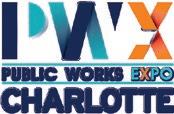



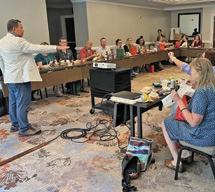


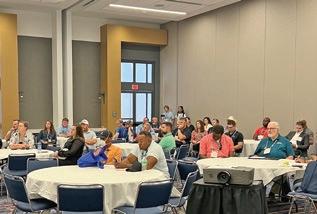








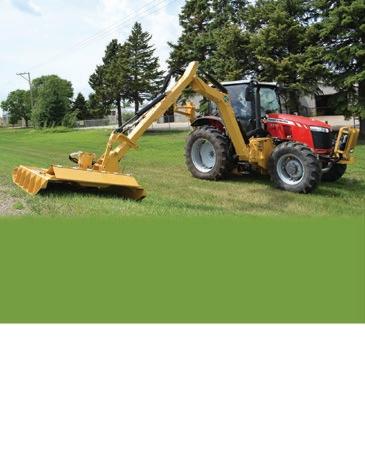

1 A realistic reading experience – This digital edition looks and feels like a real book: flip-through pages, the sounds of turning pages, and even shading along the spine all enhance your reading experience. This is the world’s first full html5 solution on the market giving you the same interactive experience as the flash version. In addition to the book layout, you can also select a presentation view that presents single pages rather than the traditional double page layout.
2. Mobile, iPad, iPhone compatibility – The html5 resizes the publication automatically so that you can view the magazine on most mobile devices.
3. eReader output – The eReader output option allows you to download ‘eBook’ files so that you can read the magazine on the growing number of eReaders such as Kindle, Nook and iBooks.
4. Thumbnail view – You can select to show a thumbnail-style navigation panel that allows you to view the entire publication at once.
5. A share feature – You can share the digital publication with friends and colleagues via social networks, including Facebook and Twitter, or via email or google.
6. Active hyperlinks connect you with all websites and emails contained in the publication.

7. Active links connect you to specific stories from the front cover and contents page.
8. Active links connect you to advertiser websites from their ads and the ad index.



9. Searchable and zoomable content allows you to search the entire issue for specific words, phrases, subjects, etc.


10. You can make Georgia Public Works’ content even more valuable by adding your own personal notes and bookmarks throughout each issue.

GEORGIA PUBLIC WORKS MAGAZINE is made possible by the companies below who convey their important messages on our pages. We thank them for their support of the APWA Georgia Chapter and its publication and encourage you to contact them when making your purchasing decisions. To make it easier to contact these companies, we have included the page number of their advertisement, their phone number, and, where applicable, their website.
Aqua Engineers 26 888-291-6677 www.aqua-engineers.com
Atlantic & Southern Equipment, LLC 32 404-361-1100 www.atlanticandsouthern.com
ClearWater Solutions, LLC 14 877-230-6228 www.clearwatersol.com

Engineered Restorations, Inc. 14 770-682-0650 www.er-inc.net
Environmental Products Group 12 404-693-9700 www.epofc.com
Ergon Asphalt & Emulsions, Inc. 2 601-933-3000 www.ergonasphalt.com
Flint Equipment Company 31 www.flintequipco.com Leasing 2, Inc. 21 813-258-9888 www.leasing2.com
MowerMax Equipment Co. 3 813-781-0100 www.mowermax.com
Pavement Technology, Inc. 27 800-333-6309 www.pavetechinc.com
Ruby-Collins, Inc 9 770-432-2900 www.ruby-collins.com
Sansom Equipment Company 30 251-631-3766 www.secequip.com
Synagro Technologies, Inc. 8 800-370-0035 www.synagro.com
Syntech Systems/FuelMaster 25 800-888-9136 www.myfuelmaster.com
Tradewinds Power Corp 4 800-223-3289 www.tradewindspower.com
Unique Paving Materials 14 800-441-4880 www.uniquepavingmaterials.com
WASCON 6 931-823-1388 www.wasconinc.com
To reach Georgia’s Public Works professionals through Georgia Public Works and its targeted readership, contact Rod at your earliest convenience to discuss your company’s promotional plans.
Rod Evason Marketing Manager P 877-985-9710 E rod@kelman.ca

























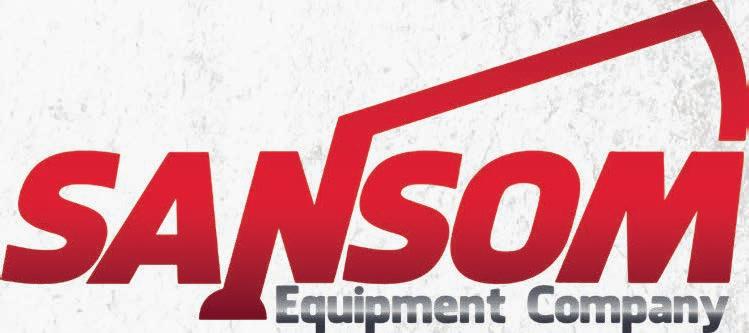







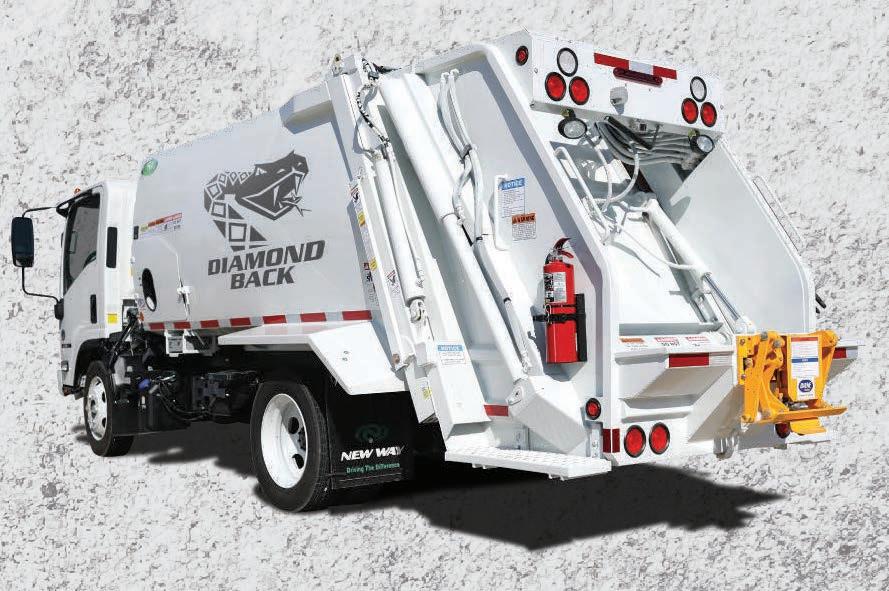


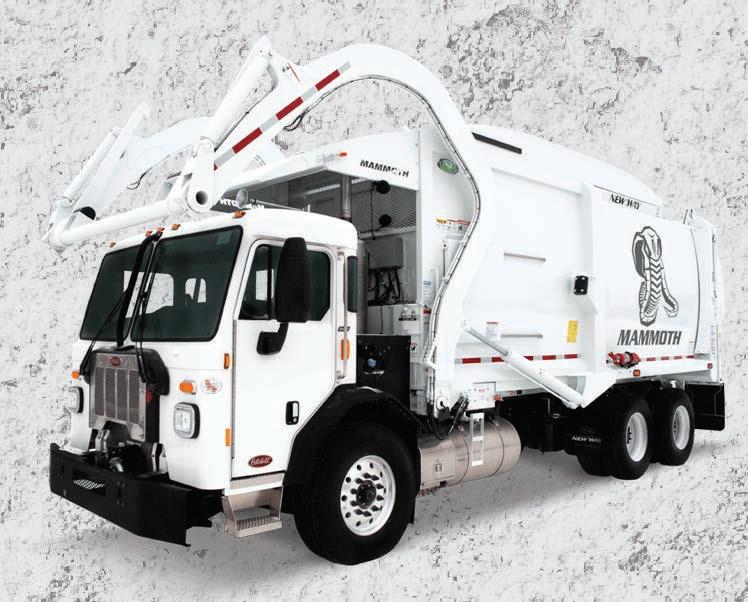


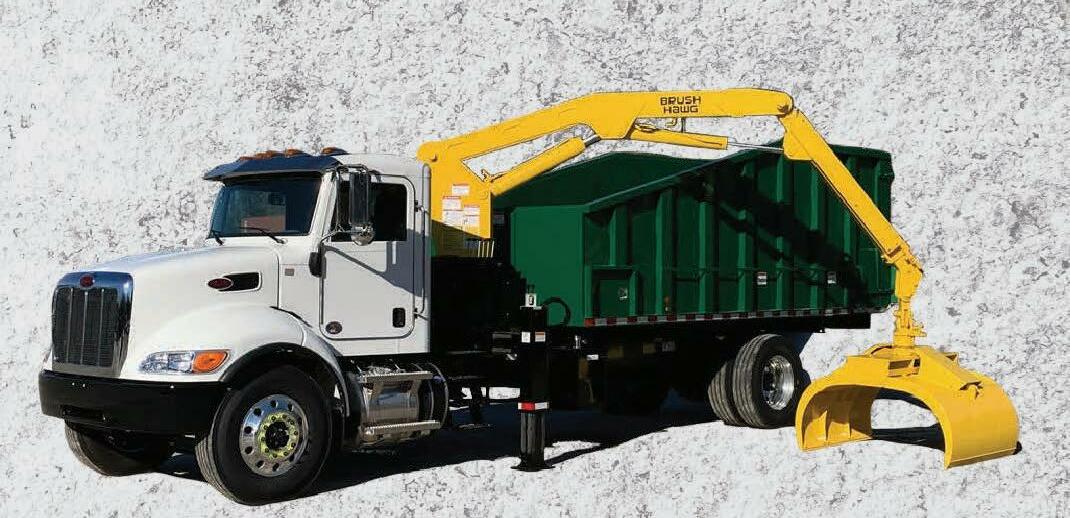













Adairsville, GA 7 70.773.9857 Albany, GA 229.888.1212 Andrews, SC 843.221.4940 Atlanta, GA 404.691.9445 Aynor, SC 843.358.5688
Braselton, GA 770.965.1889 Brunswick, GA 912.264.6161 Columbus, GA 706.687.3344 Cuthbert, GA 229.732.2631 Dothan, AL 334.794.8691



Grovetown, GA 706.855.5440 Ladson, SC 843.572.0400 Macon, GA 478.788.1586 Savannah, GA 912.964.7370 Simpsonville, SC 864.963.5835








Troy, AL 334.566.4181 Valdosta, GA 229.474.6680 Walterboro, SC 843.539.1420 West Columbia, SC 803.794.9340
 The John Deere L series backhoes at Flint deliver even more. The 3 and 4 series run with the updated 4.5L PowerTech EWL engine featuring more power and torque. The 310SL is outfitted with the best PCLS hydraulics that increase productivity and cycle times. Learn more at FlintEquipCo.com.
The John Deere L series backhoes at Flint deliver even more. The 3 and 4 series run with the updated 4.5L PowerTech EWL engine featuring more power and torque. The 310SL is outfitted with the best PCLS hydraulics that increase productivity and cycle times. Learn more at FlintEquipCo.com.
